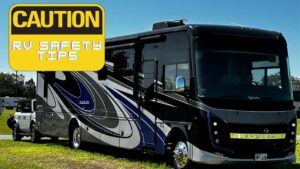
As RV enthusiasts, we know that safety is key to enjoying a memorable and stress-free journey on the road. Whether you’re a seasoned RVer or new to the lifestyle, these essential RV safety tips will help ensure you travel with confidence and peace of mind. Let’s dive in and explore how you can prioritize safety while making the most of your RV adventures.
- Perform Regular Maintenance Checks
- Conduct routine inspections of your RV, including brakes, tires, lights, and fluids. Keep an eye out for signs of wear and tear, and address any issues promptly.
- Secure Your Belongings
- Store items securely to prevent shifting during travel. Use bungee cords or non-slip mats to keep items in place and avoid potential hazards.
- Practice Safe Driving
- Familiarize yourself with your RV’s dimensions and weight. Take corners and turns slowly, maintain safe following distances, and use your mirrors effectively.
- Be Mindful of Your Weight Limit
- Avoid overloading your RV by adhering to its weight limits. Distribute weight evenly to maintain stability and improve handling on the road.
- Check Your Tires Regularly
- Inspect tires for signs of wear, proper inflation, and even tread wear. Keep a spare tire and necessary tools handy in case of a flat.
- Ensure Proper Ventilation
- Maintain proper airflow in your RV to prevent the buildup of harmful gases such as carbon monoxide. Install carbon monoxide detectors and check them regularly.
- Practice Fire Safety
- Keep fire extinguishers on hand and know how to use them. Install smoke detectors and check batteries regularly. Avoid using open flames in the RV whenever possible.
- Plan Your Route and Rest Stops
- Plan your route carefully, taking into account road conditions, elevation changes, and low-clearance bridges. Schedule regular rest stops to avoid fatigue.
- Secure Your RV and Campsite
- Lock your doors and windows when leaving the RV, and use security devices such as cameras and alarms. Secure valuable items inside the RV and store them out of sight.
- Stay Connected
- Carry a cell phone or communication device with you at all times. Share your itinerary with a trusted person so someone knows your plans in case of an emergency.
- Prepare for Emergencies
- Keep a first aid kit and emergency supplies in your RV. Familiarize yourself with nearby medical facilities and emergency contacts.
- Be Aware of Weather Conditions
- Monitor weather forecasts and be prepared for changes. Avoid traveling during severe weather and seek shelter if necessary.
Prioritizing safety while RVing ensures you can fully enjoy your travels with peace of mind. By following these tips and being prepared for potential challenges, you’ll be better equipped to handle any situation that arises. Remember, safety first, so you can savor the journey ahead!
